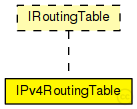 This documentation is released under the Creative Commons license
This documentation is released under the Creative Commons licenseStores the routing table. (Per-interface configuration is stored in InterfaceTable.)
For hosts, the routerId module parameter should be empty (""), in which case the loopback IPv4 address will be set to 127.0.0.1/8. For routers which have a routerId set, the loopback address will be set to routerId. (See also RFC 2072 "Router Renumbering Guide".)
RouterId may also be set to the string "auto", in which case the highest interface address will be chosen as routerId; the loopback address will remain 127.0.0.1/8.
The routing table is read from a file (parameter routingFile); the file can also fill in or overwrite interface settings. The file format is documented here.
Note that many protocols don't require routerId to be routable, but some others do -- so it is probably a good idea to set up routable routerIds.
This module has no gates; all functionality can be accessed via member functions of the C++ module class. For detailed info, please see the C++ documentation of the class (Doxygen).
See also: InterfaceTable
Author:: Jochen Reber, Andras Varga

The following diagram shows usage relationships between types. Unresolved types are missing from the diagram.

The following diagram shows inheritance relationships for this type. Unresolved types are missing from the diagram.

| Name | Type | Description |
|---|---|---|
| BGPRouterEx | compound module |
Example IP router with BGPv4 and OSPFv4 support. |
| BGPRouterSimple | compound module |
Example IPv4 router with BGPv4 support. |
| InternetCloud | compound module |
This module is an IPv4 router that can delay or drop packets (while retaining their order) based on which interface card the packet arrived on and on which interface it is leaving the cloud. The delayer module is replacable. |
| LDP_LSR | compound module |
An LDP-capable router. |
| RSVP_LSR | compound module |
An RSVP-TE capable router. |
| Name | Type | Default value | Description |
|---|---|---|---|
| interfaceTableModule | string |
The path to the InterfaceTable module |
|
| routerId | string | "auto" |
for routers, the router id using IPv4 address dotted notation; specify "auto" to select the highest interface address; should be left empty ("") for hosts |
| netmaskRoutes | string | "*" |
maintain netmask routes for interfaces |
| forwarding | bool | true |
turns IP forwarding on/off |
| multicastForwarding | bool | false |
turns multicast forwarding on/off |
| useAdminDist | bool | false |
Use Cisco like administrative distances |
| routingFile | string | "" |
routing table file name |
| Name | Value | Description |
|---|---|---|
| display | i=block/table |
| Name | Type | Unit |
|---|---|---|
| NF_ROUTE_DELETED | IPv4Route | |
| NF_MROUTE_ADDED | IPv4MulticastRoute | |
| NF_MROUTE_CHANGED | IPv4MulticastRoute | |
| NF_ROUTE_ADDED | IPv4Route | |
| NF_MROUTE_DELETED | IPv4MulticastRoute | |
| NF_ROUTE_CHANGED | IPv4Route |
// // Stores the routing table. (Per-interface configuration is stored in // ~InterfaceTable.) // // For hosts, the routerId module parameter should be empty (""), // in which case the loopback IPv4 address will be set to 127.0.0.1/8. // For routers which have a routerId set, the loopback address will be set to // routerId. (See also RFC 2072 "Router Renumbering Guide".) // // RouterId may also be set to the string <tt>"auto"</tt>, in which case the // highest interface address will be chosen as routerId; the loopback address // will remain 127.0.0.1/8. // // The routing table is read from a file (parameter routingFile); // the file can also fill in or overwrite interface settings. // The file format is documented <a href="irt.html">here</a>. // // Note that many protocols don't require routerId to be routable, but some // others do -- so it is probably a good idea to set up routable routerIds. // // This module has no gates; all functionality can be accessed via member // functions of the C++ module class. For detailed info, please see the C++ // documentation of the class (Doxygen). // // @see ~InterfaceTable // @author: Jochen Reber, Andras Varga // simple IPv4RoutingTable like IRoutingTable { parameters: string interfaceTableModule; // The path to the InterfaceTable module @display("i=block/table"); string routerId = default("auto"); // for routers, the router id using IPv4 address dotted // notation; specify "auto" to select the highest // interface address; should be left empty ("") for hosts string netmaskRoutes = default("*"); // maintain netmask routes for interfaces bool forwarding = default(true); // turns IP forwarding on/off bool multicastForwarding = default(false); // turns multicast forwarding on/off bool useAdminDist = default(false); // Use Cisco like administrative distances string routingFile = default(""); // routing table file name @signal[NF_ROUTE_ADDED](type=IPv4Route); @signal[NF_ROUTE_DELETED](type=IPv4Route); @signal[NF_ROUTE_CHANGED](type=IPv4Route); @signal[NF_MROUTE_ADDED](type=IPv4MulticastRoute); @signal[NF_MROUTE_DELETED](type=IPv4MulticastRoute); @signal[NF_MROUTE_CHANGED](type=IPv4MulticastRoute); }